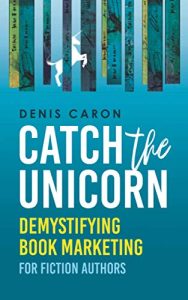Book Review: Catch the Unicorn

Book Cover Design by Booksmith Designs
I loved everything about this small book (164 pages): zero beating around the bush, sound business and craft advice, excellent mindset insights, and the price, of course. Catch the Unicorn is permanently free on Kindle.
As the author of 19 nonfiction books, I am in a good position to verify most of the book’s content just with my experience. And I tell you, the content is aligned with my experience in at least 95%. The rest? Well, the subtitle says “for fiction,” so maybe slightly different rules apply in that realm.
Let’s go over all the PROS:
1. Short and to the Point.
Hmm, actually, the only criticism I may have about Catch the Unicorn is that it is not strictly a marketing book. Quite a few pages are about basics: cover, editing, book blurb, etc. This is not marketing. Yet, those basics affect every marketing attempt, so you’d better make them right at the first attempt, instead of burning your time and money on “ineffective” marketing (the marketing is OK, but if you market a botch, no advertising budget will help you).
Yet, Denis goes over those points with a neck breaking speed and gives them only as much attention as is essential.
2. Blunt.
I love how direct the author is about the plethora of marketing methods. Yes, most of them plainly do not work. Yes, the best thing as an authorpreneur you can ever do is to focus on collecting your readers’ emails.
Blunt? It is just common sense.
3. Sound Business Advice.
Apart from being an author, Denis is also a consultant, and a good one too. His advice is to the point (and hard-won through years of experience).
Being an author means you now own a business. A successful business will always monitor the sales data and adjust their prices to maximize their profits.
Amazing, how many authors cannot even absorb this first fundamental lesson.
4. Email List.
Denis skillfully deconstructs how to start your email list, what to offer to your readers, so they will be willing to give you their email address, and how to nurture them, to turn them into your fans.
You just need to read the book, and then follow each and every step to build your own email list, even if you are technically challenged and don’t have a clue what “email list” is.
5. Actionable.
List-building methods is just one example of how easy to implement the author’s advice is. Getting reviews? He tells exactly how to do it. Organizing a book launch? He gives you a detailed plan, broken down into months and weeks. And his experience shines on every page.
Plan for only 10% of the total ARC team to leave a review on this day.”
ARC stands for Advance Readers Copy. Newbies don’t get it at all. People declare they will invest hours of their time to read the advance copy, and only 10% will actually publish a review?
That’s reality, and you know it only by publishing a number of books. Catch the Unicorn is full of such facts and stats, and they are true.
6. Mindset and Connections.
Writing is a lonely job. It doesn’t get any more social when it comes to marketing your books. And we, human beings, suck in isolation.
(…) in the vast majority of cases, we are our own worst critics and our own dream killers.”
The last chapter of Catch the Unicorn reads as a good personal development book. All the technicalities in the world will not help you one ounce, if you kill your dreams by your own hands.
I fully agree with every bit of Denis’ advice about connecting with readers, fellow authors, and influencers in your space. You need them all to catch the unicorn. It takes a village to raise a child, but it also takes a village to successfully market a book.
Summary
This is a great starter for any newbie author. It is especially valuable to wannabes who are writing their first book and have little clue about marketing – and even less practice with it.
Instead of trying to experiment with a zillion different options, you will get a step-by-step program to write, publish and market your book with success. Catch the Unicorn is a priceless resource for fiction authors overwhelmed with book marketing.
It is good for nonfiction authors too.
The post Book Review: Catch the Unicorn appeared first on ExpandBeyondYourself.
